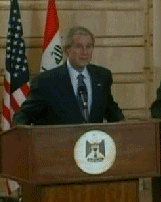There was good news and bad news in 2008.
First, lots of bad news:
The economy: From my perspective, it was already going downhill last January. I knew something was up when the minister’s discretionary fund at church was out of money, more people were asking me for money, and no one could afford to donate any more money. In September, Wall Street and the media finally woke up to the fact that our economy has been driven by predatory lending and Ponzi schemes for the past decade, and suddenly we were in a “global financial crisis.” The Dow Jones industrial average fell 34% in 2008, the biggest one-year drop since 1931.
War: The war in Iraq went nowhere. The much-vaunted surge didn’t seem to change anything except that the federal government was spending even more money over there, and the few people who were willing to be soldiers were going over for their fourth or fifth deployment. No improvement, just a slow ongoing decline. Blessed would the peacemakers be, if we had any peacemakers.
Climate: Summer was hot, hotter than ever. Yeah, I know that global warming is “just a theory” and “not really based on facts.” Even if it is true (and it is indeed a well-proven theory), we’re supposed to be calling it global climate change. Well, the result of global climate change here in New England is that it was hot last summer, and it is freakishly warm this winter.
But also quite a bit of good news:
Green technology: “On October 3, President Bush signed into law the Economic Stabilization Act of 2008 that included the hoped-for 8-year extention of the solar investment tax credit. The act also lifted the $2,000 cap on the tax credit for residential systems, granting both commercial and residential systems eligibility for a 30% tax credit…. The law will encourage rapid growth for the solar industry….” (Distributed Energy: The Journal of Energy Efficiency and Reliability, November/December, 2008, p. 50.) The lousy economy is driving us to become more energy-efficient, and to develop renewable energy sources.
Green religion: One of the more interesting things to come out of the presidential campaign was that about half the Christian evangelicals are now promoting what they call “Creation care.” It’s a little weird that they can’t bring themselves to say “ecotheology” or “environmentalism,” but at least they’re headed in the right direction, and are starting to catch up with liberal and moderate religious groups.
Personal: This marked year 19 with Carol, which is better than I can express. I have wonderful extended family, great friends, and a job that I love. I know 2008 was a tough year for many people, but from my selfish point of view it was a great year.
The president: Obama is no saint, by world standards he is pretty conservative, he has far too many ties to the corporate puppet-masters, but — he is Not-George-Bush. And as for George Bush, the shoe incident sums it up for me:

Yup. At great personal cost, Muntadar al-Zaidi became an instant folk-hero by summing up what many people around the world think about George Bush. (Image courtesy Dependable Renegade.)
